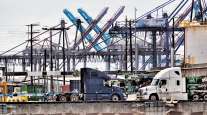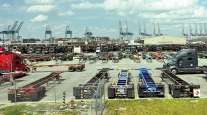Drayage Carriers Press for Chassis Details
This story appears in the Oct. 18 print edition of Transport Topics.
Drayage carriers said they are pressing ocean cargo lines for more details about plans to make truckers responsible for supplying intermodal chassis.
“There is a big unknown right now,” David Manning, president of Tennessee Express, Nashville, Tenn., told Transport Topics. “We are getting some conflicting information. There are mixed signals as to what [ocean carriers] are doing.”
Several ocean carriers in recent months have announced plans to begin requiring that fleets take responsibility for chassis used to deliver or pick up freight.
Those ocean carriers include Evergreen Marine, NYK Line, Orient Overseas Container Line, Hyundai Merchant Marine and Atlantic Container Line.
Manning said some ocean carriers even have issued press releases stating their plans to exit the chassis business. However, their representatives haven’t provided details about potential changes.
Curtis Whalen, executive director of the Intermodal Motor Carriers Conference of American Trucking Associations, said the group’s members are concerned.
“The chassis situation is still confusing,” he said. “I thought there was a grand plan. I’ve been trying to meet with the [ocean] lines with no success. We don’t know what the hell is going on.”
Despite the frustration, there has been progress.
Carriers such as Maersk Line and lessors such as Trac Intermodal have developed workable programs to help intermodal carriers cope during the transition, said Chris Giltz, senior vice president for Evans Delivery, an intermodal trucker based in Schuykill Haven, Pa.
Denmark-based Maersk, the largest ocean carrier, began the chassis exodus last year when it began charging a daily rental fee for chassis that fleets could use to carry any ocean carrier’s container.
Until Maersk’s program began, chassis were provided free to truckers in the United States. Everywhere else, drayage firms own and manage their own chassis.
“We are trying to understand where the market is headed,” Manning said. “[Ocean carriers] realize that pulling out of the chassis business would create a void. They would like to get there [i.e., stop offering chassis], execute their strategies and get out of the chassis business.
“I’d certainly like to find a joint solution,” Manning said. “It’s a question of how we get there.”
Manning added that drayage carriers probably will have to rely on a fleet of chassis in some locations that anyone can use.
That approach could help highway carriers to avoid having their own equipment tied up in places such as rail yards where they can’t control it.
In other markets, fleets may be able to justify owning chassis, he said.
Giltz said his company has hired one full-time and one half-time person to process chassis bills. In general, customers have been willing to reimburse fleets for the new chassis charges, he said.
Though the billing process has changed, operations remain smooth.
“We are now getting bills from Trac for daily usage,” Giltz said. “But we are doing the same moves as before. From an operations standpoint, things are status quo.”
Giltz also singled out CMA CGM, a French-based ocean carrier, for providing useful information about the transition and currently available chassis plans. Trac provides chassis in the United States for CMA.
“They have done a good job of reaching out so far to truckers,” he said. “Trac deserves credit for talking to truckers and trying to work out the kinks. It is a big change for them as well as for us.”
Giltz raised one other issue.
“One of the main things we will be looking at when we have a choice of chassis providers will be their tire policies,” he said. “Those have been extremely unfair.”
For example, he said, drayage carriers will receive invoices from vendors for damage to tires on chassis that are sitting in terminals where it isn’t practical for trucking company officials to verify the alleged damage.
As a result, owner-operators or the trucking company unfairly are forced to pay for repairs to tires that often are substandard, he said.
“We will be looking to utilize a vendor that modifies the current practices,” Giltz said.
Chassis policy changes followed the implementation of a U.S. rule that required ocean carriers to be responsible for chassis condition instead of truckers. Carriers such as Atlantic Container Line that have commented publicly beyond their announcements have said the chassis safety rules weren’t a factor in their decision.




